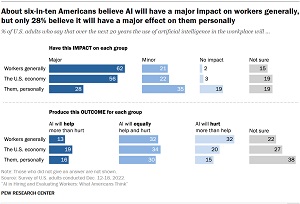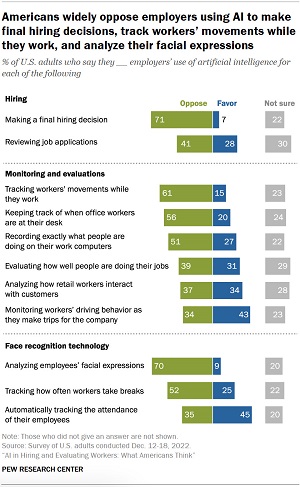News
AI in the Workplace: 'Americans Are Wary and Sometimes Worried'
A new Pew Research Center survey-based report about the use of AI in the workplace finds widely diverging views on the topic, though respondents are generally wary and uncertain of AI being used in hiring and assessing workers.
Published today (April 20), the report, titled "AI in Hiring and Evaluating Workers: What Americans Think," is based on a survey of 11,004 U.S. adults conducted Dec. 12-18, 2022, which was less than two weeks after the debut of the groundbreaking ChatGPT chat bot from Microsoft partner OpenAI, not to mention being well prior to the release of OpenAI's supercharged GPT-4 large language model (LLM). Recent advances in AI tech -- especially in machine language LLMs -- have progressed so rapidly that many in the industry have called for a slowdown on development to address safety, legal, ethical and other concerns.
However, even though respondents weren't aware of the increased scrutiny and blowback around AI advances, they were still found by Pew to be "watching the general spread of AI with a range of concerns, especially when the use of AI systems raises the prospect of discrimination and bias."
"Americans are wary and sometimes worried," Pew said in the report. "For instance, they oppose AI use in making final hiring decisions by a 71 percent to 7 percent margin, and a majority also opposes AI analysis being used in making firing decisions. Pluralities oppose AI use in reviewing job applications and in determining whether a worker should be promoted. Beyond that, majorities do not support the idea of AI systems being used to track workers' movements while they are at work or keeping track of when office workers are at their desks."
Interestingly, while 62 percent of respondents believed AI will have a major impact on jobholders overall in the next 20 years, only 28 percent believe it will greatly affect them personally, as shown in the charts below.
 [Click on image for larger view.] AI Will Greatly Impact Many, but Not Me (source: Pew Research Center).
[Click on image for larger view.] AI Will Greatly Impact Many, but Not Me (source: Pew Research Center).
As far as the wariness and worry, the chart below illustrates how Americans widely oppose employers using AI to make final hiring decisions, track workers' movements while they work and analyze their facial expressions.
 [Click on image for larger view.] Wary and Worried (source: Pew Research Center).
[Click on image for larger view.] Wary and Worried (source: Pew Research Center).
"They reject the idea that AI would be used in making final hiring decisions, by a ratio of roughly ten-to-one," the report said. "A smaller plurality (41 percent) also opposes the use of AI in reviewing job applications. These findings line up with a theme in Center research: that people are not comfortable ceding final decision-making to a computer program."
Other data points include:
- 47 percent of respondents think AI would do better than humans at evaluating all job applicants in the same way, while a much smaller share -- 15 percent -- believe AI would be worse than humans in doing that.
- Among those who believe that bias along racial and ethnic lines is a problem in performance evaluations generally, more believe that greater use of AI by employers would make things better rather than worse in the hiring and worker-evaluation process.
- Asked about potentially beneficial or harmful effects of AI in workplaces in the next 20 years, a higher share say it will hurt more than help workers than say the inverse. About a third of Americans (32 percent) think the benefits and harms will be equally split for workers generally, while 22 percent are not sure about its potential effect.
- When it comes to Americans' opinions about the impact of AI use in the workplace on the overall U.S. economy, 56 percent think over the next 20 years the impact will be major, while 22 percent believe it will be minor. A small fraction (3 percent) say there will be no impact and 19 percent are not sure.
- By a 55 percent to 14 percent margin, adults oppose the prospect that employers would use information collected and analyzed by AI about their workers' job performance to decide whether someone should be fired from their job.
- About two-thirds of Americans say they would not want to apply for a job if AI were used to help make hiring decisions.
- Public believes AI would be better than humans in treating applicants equally but would struggle with seeing potential in candidates.
- Surveillance, data mismanagement, misinterpretations are among potential outcomes the public foresees in AI-enabled workplaces.
- About half of Americans say AI would do a better job than humans at treating all job applicants in the same way.
- Lack of "human factor" is most common reason for not wanting to apply for job that uses AI in the hiring process.
Methodology for the report is detailed here.
About the Author
David Ramel is an editor and writer at Converge 360.